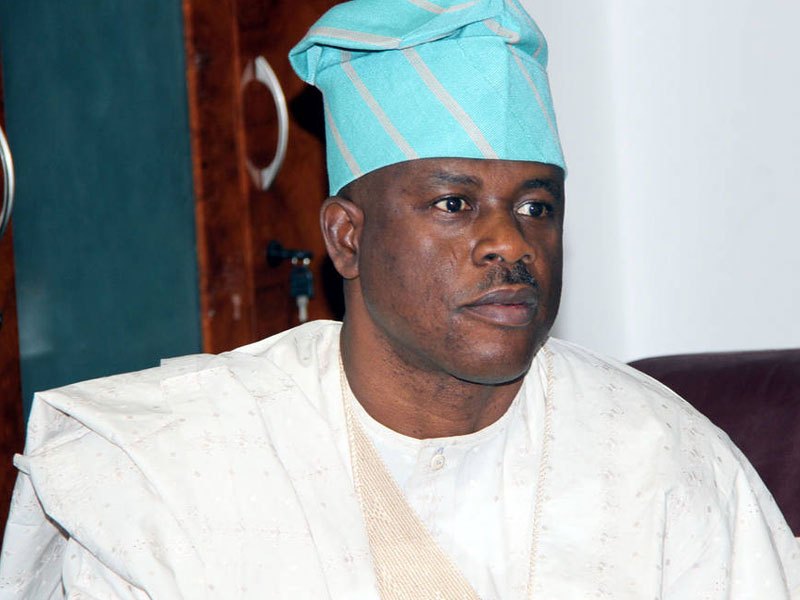- Fresh EFCC Probe Links Obanikoro to Diezani Poll Cash
A former Minister of State for Defence, Senator Musiliu Obanikoro, has been fingered in a new N400m scam.
Impeccable sources in the Economic and Financial Crimes Commission told our correspondent on Sunday that Obanikoro, who was released last Friday, might be invited again soon to explain his alleged role in the scam.
The ex-minister, who returned from the United States on October 17, spent three weeks at the Abuja office of the EFCC for allegedly receiving N4.7bn from the Office of the National Security Adviser and distributing over N3bn to Governor Ayodele Fayose of Ekiti State and Senator Iyiola Omisore, who were the governorship candidates of the Peoples Democratic Party in Ekiti and Osun states respectively in 2014.
Obanikoro subsequently returned N100m to the EFCC with a promise to return another N480m.
His American and Nigerian passports were subsequently seized before his release last Friday.
An EFCC detective on Sunday told our correspondent that recent investigations showed that Obanikoro allegedly received N400m from a former Minister of Finance, Senator Nenadi Usman, who was the Director of Finance of the Goodluck Jonathan Campaign Organisation during the build-up to the 2015 elections.
The source said sometime in 2015, Usman sent the money to Obanikoro through a proxy.
The detective said, “As part of investigations into the billions disbursed by Nenadi Usman during the build-up to the 2015 elections, we interrogated a suspect at our office. The suspect told us that he handed over N400m to Obanikoro in the presence of some PDP members.
“So, Obanikoro will be invited to the Lagos office of the EFCC to tell his own side of the story.”
The EFCC had alleged in March that about N3.145bn was mysteriously transferred from the account of the ONSA, domiciled in the Central Bank of Nigeria, to the account of Joint Trust Dimensions Limited, a company allegedly owned by Usman.
Usman was said to have transferred N840m to the account of the Director of Publicity of the organisation, Chief Femi Fani-Kayode, in Zenith Bank on February 19, 2015, while she allegedly gave a former finance minister, Chief Olu Falae, N100m on the instruction of a PDP stalwart, Chief Anthony Anenih.
A former Governor of Imo State, Achike Udenwa, and a former Minister of State for Foreign Affairs, Viola Onwuliri, according to the documents, got N350m in two tranches.
The first tranche of N150m was allegedly paid into their joint account with Zenith Bank on January 13, 2015. The second tranche of N200m was credited into their account with Diamond bank.
Usman and Fani-Kayode have since been arraigned before the Federal High Court in Lagos and their accounts frozen while Udenwa and Falae may be arraigned soon.
Apart from the ONSA fund, Usman allegedly disbursed a separate N23bn to various states during the build-up to the elections.
The money Usman disbursed allegedly emanated from a former Minister of Petroleum Resources, Diezani Alison-Madueke.
The money, which was $115m but converted to N23bn, was alleged to have been kickbacks from some dubious oil contractors involved in oil theft.
The EFCC has, so far, grilled about 16 former governors and ministers over the alleged N23bn Diezani sleaze.
Some of them include the immediate past Governor of Kebbi State, Saidu Dakin Garin; former Governor Sullivan Chime of Enugu State; former Governor Ibrahim Shekarau of Kano State; former Governor Ali Modu Sheriff of Borno State; former Governor James Ngilari of Adamawa State; and a former Governor of Zamfara State, Mamuda Shinkafi.
Among the others are a former Governor of Cross River State, Senator Liyel Imoke; a former Minister of State for FCT, Jumoke Akinjide; and a former Minister of State for Finance, Ambassador Bashir Yuguda.
During the elections, each state was said to have received at least N450m from the fund, which was handled by ministers or governors, who were members of the PDP.
All attempts to speak with Obanikoro’s media aide, Jonathan Eze, proved abortive on Sunday
as his phone indicated that it was switched off.
A source close to Obanikoro, however, told our correspondent that the ex-minister was not in charge of former President’s Goodluck Jonathan’s Lagos campaign and therefore could not have received such money.
He said, “I am aware that the EFCC has interrogated the person who collected money for the Jonathan campaign organisation. However, Senator Obanikoro never collected N400m from him.
“Those who collected money at Federal Palace Hotel know themselves and they should please leave Senator Obanikoro out of it.”


 Naira3 weeks ago
Naira3 weeks ago
 News4 weeks ago
News4 weeks ago
 Naira4 weeks ago
Naira4 weeks ago
 Jobs3 weeks ago
Jobs3 weeks ago
 Naira3 weeks ago
Naira3 weeks ago
 Travel3 weeks ago
Travel3 weeks ago
 Naira3 weeks ago
Naira3 weeks ago
 Investment4 weeks ago
Investment4 weeks ago





























